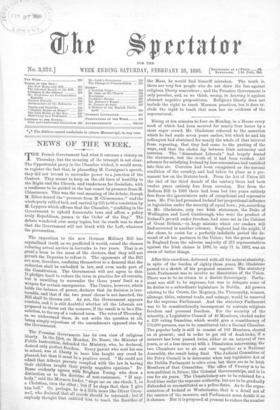After this exordium, delivered with all his natural elasticity, in
spite of the burden of eighty-three years, Mr. Gladstone passed to a sketch of his proposed measure. The statutory Irish Parliament was to involve no dissolution of the -Union. There was to be no return to a double Sovereignty. Parlia- ment was still to be supreme, but was to delegate some of its duties to a subordinate legislature in Dublin, All powers relating to the Crown, the Regency, the Vioeroyalty, treason, alienage, titles, external trade, and coinage, would be reserved for the supreme Parliament. And the statutory Parliament was to be constitutionally incompetent to restrain religious freedom and personal freedom. For the security of the minority, a Legislative Council of 48 Members, elected under a a243 rating franchise, which would give a constituency of 170,000 persons, was to be constituted into a Second Chamber. The popular body is still to consist of 103 Members, elected as at present; and in order to get rid of dead-locks, if a measure has been passed twioe, either at an interval of two years, or at a less interval with a Dissolution intervening, the two Chambers are to sit and vote together as a National Assembly, the result being final. The Judicial Committee of the Privy Council is to determine when any legislative Act of the Dublin Parliament is ultra sires, but there are to be Irish Members of that Committee. The office of Viceroy is to be non-political in future, like Colonial Governorships, and is to run for six years. The Constabulary are to be retained for a fixed time under the supreme authority, but are to be gradually disbanded or reconstituted as a police-force. As to the repre- sentation of Ireland at Westminster, that is a detail not of the essence of the measure, and Parliament must decide it as it chooses. Bat it is proposed at present to reduce the number of Irish representatives to 80, and to lay down rules under which they should vote only on Imperial or Irish subjects. The Imperial Government collects and retains the Irish Customs duties as about equivalent to her share of common expenditure ; but Ireland is to be started with a net balance of half-a-million a year (representing the interest on a capital sum of about £17,000,000) in her favour. Customs, Excise, Post Office, and Telegraphs are to be uniform for all the three Kingdoms. In other words, the commercial union is to be secure.



































 Previous page
Previous page